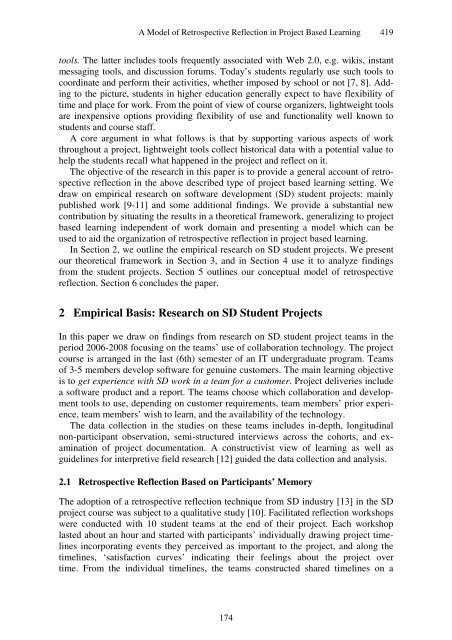The work-reflection-learning cycle - Department of Computer and ...
The work-reflection-learning cycle - Department of Computer and ...
The work-reflection-learning cycle - Department of Computer and ...
Create successful ePaper yourself
Turn your PDF publications into a flip-book with our unique Google optimized e-Paper software.
A Model <strong>of</strong> Retrospective Reflection in Project Based Learning 419<br />
tools. <strong>The</strong> latter includes tools frequently associated with Web 2.0, e.g. wikis, instant<br />
messaging tools, <strong>and</strong> discussion forums. Today’s students regularly use such tools to<br />
coordinate <strong>and</strong> perform their activities, whether imposed by school or not [7, 8]. Adding<br />
to the picture, students in higher education generally expect to have flexibility <strong>of</strong><br />
time <strong>and</strong> place for <strong>work</strong>. From the point <strong>of</strong> view <strong>of</strong> course organizers, lightweight tools<br />
are inexpensive options providing flexibility <strong>of</strong> use <strong>and</strong> functionality well known to<br />
students <strong>and</strong> course staff.<br />
A core argument in what follows is that by supporting various aspects <strong>of</strong> <strong>work</strong><br />
throughout a project, lightweight tools collect historical data with a potential value to<br />
help the students recall what happened in the project <strong>and</strong> reflect on it.<br />
<strong>The</strong> objective <strong>of</strong> the research in this paper is to provide a general account <strong>of</strong> retrospective<br />
<strong>reflection</strong> in the above described type <strong>of</strong> project based <strong>learning</strong> setting. We<br />
draw on empirical research on s<strong>of</strong>tware development (SD) student projects: mainly<br />
published <strong>work</strong> [9-11] <strong>and</strong> some additional findings. We provide a substantial new<br />
contribution by situating the results in a theoretical frame<strong>work</strong>, generalizing to project<br />
based <strong>learning</strong> independent <strong>of</strong> <strong>work</strong> domain <strong>and</strong> presenting a model which can be<br />
used to aid the organization <strong>of</strong> retrospective <strong>reflection</strong> in project based <strong>learning</strong>.<br />
In Section 2, we outline the empirical research on SD student projects. We present<br />
our theoretical frame<strong>work</strong> in Section 3, <strong>and</strong> in Section 4 use it to analyze findings<br />
from the student projects. Section 5 outlines our conceptual model <strong>of</strong> retrospective<br />
<strong>reflection</strong>. Section 6 concludes the paper.<br />
2 Empirical Basis: Research on SD Student Projects<br />
In this paper we draw on findings from research on SD student project teams in the<br />
period 2006-2008 focusing on the teams’ use <strong>of</strong> collaboration technology. <strong>The</strong> project<br />
course is arranged in the last (6th) semester <strong>of</strong> an IT undergraduate program. Teams<br />
<strong>of</strong> 3-5 members develop s<strong>of</strong>tware for genuine customers. <strong>The</strong> main <strong>learning</strong> objective<br />
is to get experience with SD <strong>work</strong> in a team for a customer. Project deliveries include<br />
a s<strong>of</strong>tware product <strong>and</strong> a report. <strong>The</strong> teams choose which collaboration <strong>and</strong> development<br />
tools to use, depending on customer requirements, team members’ prior experience,<br />
team members’ wish to learn, <strong>and</strong> the availability <strong>of</strong> the technology.<br />
<strong>The</strong> data collection in the studies on these teams includes in-depth, longitudinal<br />
non-participant observation, semi-structured interviews across the cohorts, <strong>and</strong> examination<br />
<strong>of</strong> project documentation. A constructivist view <strong>of</strong> <strong>learning</strong> as well as<br />
guidelines for interpretive field research [12] guided the data collection <strong>and</strong> analysis.<br />
2.1 Retrospective Reflection Based on Participants’ Memory<br />
<strong>The</strong> adoption <strong>of</strong> a retrospective <strong>reflection</strong> technique from SD industry [13] in the SD<br />
project course was subject to a qualitative study [10]. Facilitated <strong>reflection</strong> <strong>work</strong>shops<br />
were conducted with 10 student teams at the end <strong>of</strong> their project. Each <strong>work</strong>shop<br />
lasted about an hour <strong>and</strong> started with participants’ individually drawing project timelines<br />
incorporating events they perceived as important to the project, <strong>and</strong> along the<br />
timelines, ‘satisfaction curves’ indicating their feelings about the project over<br />
time. From the individual timelines, the teams constructed shared timelines on a<br />
174
















